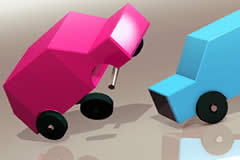Rollover Accidents And Ways To Prevent Them From Happening - Vol.217
Vehicular rollover accidents are a truly terrifying experience. You feel completely helpless, as the only thing within your power is to sit and wait while until the vehicle comes to a stop, all the while praying that some other-wordly force is looking out for you.
Out of all the vehicles manufactured around the world, SUVs are the most notorious for rollovers. According to PBS, SUVs experience 40 times the number of rollover fatalities, as any other type of vehicle on the road; this is largely due to the higher level of gravity and relatively narrow build of SUVs, but given the right road conditions, just about any car has the potential to rollover. Knowing how to avoid a rollover in the first place, and what to do if a roller does occur can be crucial to saving your life.

How to Avoid a Rollover
1. Tire Pressure:
Rollovers can happen to anyone at anytime, even you. The first thing that you should do to avoid one in the first place is to watch your tire pressure. When a tire is even partially under inflated, your vehicle has a higher propensity to flip because the center of balance is thrown off on one side.
2. Don't Overcorrect:
Avoid making sudden turns or sharp movements with the wheel. If you have to go around a sharp turn, head the recommended speed signs as those are posted for a reason! If you find yourself going to fast and feel yourself loosing control of the vehicle, don't try to overcorrect; you're better off doing what you can to slow the vehicle down or going into a ditch if it isn't too steep. This will only cause your vehicle to loose control and enter into what could be a deadly roll.
Statistics show that most rollover accidents occur at night when people have more opportunities to lower their guard and pay less attention to the road. This rule stays the same if an animal runs out in front of your car. If a small animal or even a house pet step into the road, don't risk your own life trying to save theirs.
3. Slow Down When It's Wet
Slow your vehicle down below the speed limit and remove cruise control when it's wet on the roads or raining. Don't worry if people are following you close behind, let them pass and risk their own safety. The problem is that tires aren't very good at driving on wet roads, and when the water on the road is high enough or the roads are slick from oil, your tires will loose grip and enter into what is called "hydroplaning."
If you feel yourself hydroplaning, stay calm, take your foot off the accelerator, and hold the wheel with both hands straight. Don't attempt to dramatically correct steering. Do your best to let the car slow down on its own, but slowly pump the breaks with one foot if you absolutely have to avoid accident or serious risk to your safety.
What To Do During a Rollover
Now you know how to avoid a rollover, but what should you do if a rollover is inevitable and you can't do anything to prevent it. As crazy as it sounds, stay as calm as possible and try to let go of all muscle tensions. You might have heard that during drunk driving accidents, the ones who drinking have been known to experience fewer injuries than the other party. This is because the alcohol reduces control on ones body and makes for more fluid movement, allowing the body to move with the motions car instead of against it.
Ultimately, the most important thing to help save your life is always where your seatbelt. You might not appreciate it now, but if you are ever in one of these situations, it will keep you fastened in one place and significantly increases your chances for survival.